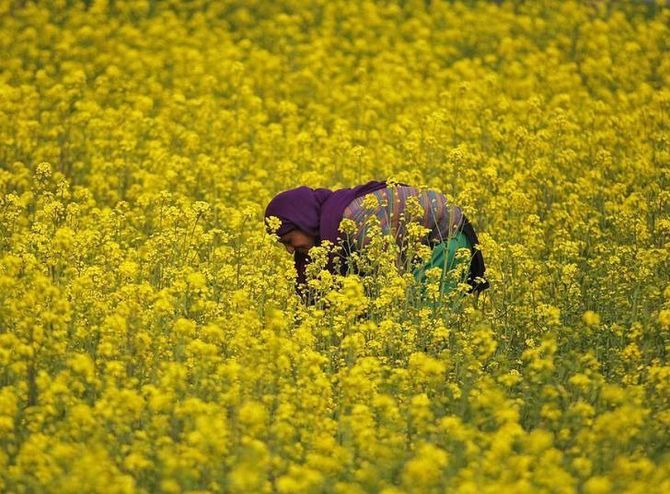The Russia-Ukraine crisis, along with general bullishness in agricultural commodities, has ensured that after a fairly long time, most of the 24 commodities for which the Centre declares the minimum support price (MSP) are trading above it.

The exceptions here are chana or gram and a few varieties of pulses.
This might gladden the farmers, especially those who are still holding on to their stocks from the previous kharif harvest or are harvesting the latest rabi crop.
But this could stoke retail and wholesale inflation.
The data sourced from market agencies and traders showed that among the crops being harvested in the ongoing rabi season, the prices of mustard seed and wheat, the two biggest commodities, are selling above their MSPs, but chana, the biggest pulses variety grown in India, is quoting below that benchmark.
Chana (gram)
Chana prices in most major markets were quoted at Rs 4,700-4,800 a quintal, or 9-11 per cent lower than the MSP until Wednesday.
Moong was selling much below its MSP of Rs 7,275 a quintal in the main trading centres.
“Chana production is big this year while, at the same time, the government is liquidating its inventory, which is keeping prices down,” Rahul Chauhan, commodity analyst at iGrain India, said.
The chana crop in the ongoing rabi season is expected to be huge.
According to the second advance estimate of foodgrains production, released some time ago, chana output in 2021-22 is set to be at an all-time high of 13.12 million tonnes (up 10.16 per cent from last year).
Wheat and rice
Wheat prices across the country have shot up in the past few weeks owing to a surge in export demand following the Russia-Ukraine crisis.
Market sources say wheat in most areas was selling at Rs 2,300-2,500 a quintal until a few days ago, while the MSP is Rs 2,015.
The prices of Indian wheat in world markets had shot up to about $360 per tonne (FOB) a few days ago, cooling a bit to $340-350 during the past few days.
Indian wheat is among the cheapest in all producing countries and the absence of Ukraine and Russia from world markets for the next few months will give Indian traders a good chance to ship record quantities this fiscal year and even in FY23.
Trade and government sources said India was expected to export 7-7.2 million tonnes, a record, this fiscal year.
India is expected to harvest 111 million tonnes of wheat in 2022-23 (April-March), which is also a record and almost 2 million tonnes more than this year.
Paddy prices in open markets have also risen in the past few weeks due to renewed export demand because global buyers are looking to replace costly wheat and corn that is to be used as animal feed with poor-quality rice Asian countries produce.
“Demand for Indian broken rice has gone up because of higher corn prices.
"Feed makers are trying to replace corn with rice,” Reuters had reported quoting B V Krishna Rao, president of India’s Rice Exporters Association.
Mustard
Mustard prices are ruling much above the MSP largely because of overall bullishness in the global edible oil markets, aggravated by the Ukraine crisis.
The trade data shows mustard prices in Jaipur at Rs 7,000-7,100 per quintal, or 39-41 per cent more than the MSP of Rs 5,050, while in Bharatpur
it was selling at Rs 6,595 a few days ago.
“Mustard prices are expected to remain above the MSP due to global factors, but there might be a slight moderation due to increased arrivals after Holi,” Chauhan of iGrain said.
According to the second advance estimate, mustard production in 2021-22 is estimated at 11.49 million tonnes (up 12.54 per cent from last year).
Sunflower oil
Russia and Ukraine together account for almost 90 per cent of the annual 2.5 million tonnes of sunflower oil imported into India.
Sunflower oil is the third-largest edible oil imported into the country, after palm and soybean oil.
The stopping of sunflower oil imports has put the entire pressure on palm oil and soybean oil, whose prices have further pushed up.
The crisis has been aggravated by Indonesia’s decision to allocate a greater proportion of its palm oil production for domestic consumption than exports.
Among other crops, soybean prices continue to rule above its MSP, while it is so also for cotton.
Prices of barley traded 41-56 per cent more than its MSP of Rs 1,635 per quintal while maize was quoting at almost 18 per cent more than its MSP of Rs 1,870 per quintal in major markets till Wednesday.











